Polling firm Gallup has revealed that residents from many of the countries that formed the Balkan route of the 2015 European migrant crisis have some of the most negative views of migrants in the world.
The survey, measured on an index out of a possible 9.0 favourability, found the countries most favourable to new migrants was Canada, which registered 8.46, followed by Iceland at 8.41. Sweden also ranked high at 7.92 and Ireland at 7.88, while the Unites States ranked at 7.95.
At the other end of the spectrum, North Macedonia was the least favourable to migrants with an index score of 1.49, followed by Hungary at 1.64. Aside from Hungary, the majority of the six countries least favourable to migrants were Balkan states, with Serbia at 1.79, Croatia 1.81, Bosnia and Herzegovina 1.85, and Montenegro at 1.87.
The results may be hardly surprising as many of those nations comprised the 2015 ‘Western Balkan route’, where hundreds of thousands of Syrians and other migrants from the Middle East and Asia used their countries as thoroughfares to more generous northern EU nations like Germany. According to official figures by the EU’s border agency Frontex, more than 764,000 migrants travelled through Turkey and along the Western Balkan route in 2015, with over 130,000 making the journey the following year.
Numbers fell dramatically in 2017 (to just over 12,000) after the EU agreed on a pact with Turkey to stop the flow and when countries like Hungary took a strong line on illegal mass migration. Hungarian Prime Minister Viktor Orbàn enacted strict border protections, hiring more border guards and erected a fence along its border with Serbia so that by late 2017, illegal migration through the central European country had been slashed by 99 per cent.
Balkan countries remained resolute in stopping illegal migration when in February when Turkish President Recep Tayyip Erdogan threatened to break his migrant treaty with the EU and open the borders to Europe.
The “Migrant Acceptance Index” is based on the answers to three questions regarding migrants living in the country, migrants living in the same neighbourhood as the respondents, and migrants marrying one of the respondent’s relatives.
Overall, Gallup states that acceptance of migrants has gone down globally. However, pollsters saw a particular decline in several countries, including Belgium, where favourability had shrunk from 6.16 in 2016 to 4.83 in 2019. Gallup claims the rise of anti-mass migration political parties since 2016 could be a factor in the decline.
While countries like Germany and Sweden welcomed migrants to solve the apparent demographic problems, Hungary’s Orbàn has instead embraced pro-family policies to increase the population naturally and at home.
The government’s pro-family policies, only recently enacted, have already shown results according to Hungarian Family Minister Katalin Novák who said last month that the birth rate had increased by five per cent compared to the year before.
Marriages in Hungary have also increased in 2020, while deaths have decreased compared to 2019.

COMMENTS
Please let us know if you're having issues with commenting.